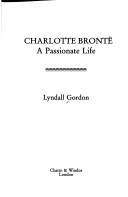The standard view of Charlotte Bronte is of the reclusive genius, sacrificing herself for her ill-fated brother and sisters and her demanding father in the isolated gloom of the parsonage high on the Yorkshire moors. Lyndall Gordon brings her life out of the shadows and throws a new light on the novels, particularly "Jane Eyre" and "Villette". Behind the quiet, modest public figure stands a woman who is eccentric, romantic, satirical and far from tame. Lyndall Gordon tells the story of her life and shows how her rebellion as well as her passionate involvements with men (the charismatic Belgian...Read more
The standard view of Charlotte Bronte is of the reclusive genius, sacrificing herself for her ill-fated brother and sisters and her demanding father in the isolated gloom of the parsonage high on the Yorkshire moors. Lyndall Gordon brings her life out of the shadows and throws a new light on the novels, particularly "Jane Eyre" and "Villette". Behind the quiet, modest public figure stands a woman who is eccentric, romantic, satirical and far from tame. Lyndall Gordon tells the story of her life and shows how her rebellion as well as her passionate involvements with men (the charismatic Belgian teacher, Paul Heger, and her young London publisher, George Smith) and women lie behind her fiction. With access to letters and journals, she unearths new evidence about Charlotte's writing life, and about her last illness and her death. For the author, Bronte used the convention of her day as a protective cover, wilfully and cleverly, to fulfill her burning ambition to have her own voice heard.
